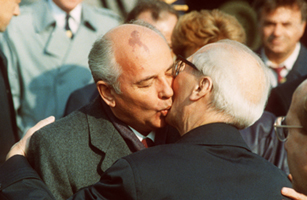
The kiss Gorbachev embraces East Germany's hard-line Erich Honecker at 40th-anniversary celebrations for the G.D.R. Weeks later, Honecker — and the Wall — were gone
May 25, Moscow, U.S.S.R.
My most treasured souvenir of Moscow in 1989 is a white laminated card with a decorative blue border and a sketch of the Kremlin on the front. It's the official menu of the first session of the Congress of People's Deputies, a gathering that started on May 25 of that year and which, in hindsight, marked the beginning of the end of Soviet power.
The menu is very Soviet. The choice of items is limited, the language terse — "bread with cheese," "meat broth" — and the prices ridiculously low. A caviar sandwich cost 56 kopeks, which at the official exchange rate was about 80 cents but in reality about half that or less. The very fact that delicacies such as caviar, iced pastries and oranges were served in the congress canteen at a time of major national food shortages, is a reminder of how the Kremlin élite lived in a world of privilege far removed from the everyday hardships suffered by their subjects.
Yet in almost every other way, the proceedings of that congress marked an astonishing break with Soviet tradition. Such gatherings had previously consisted of fawning functionaries voting unanimously in favor of official Communist Party decisions, turning the glass-and-concrete-fronted Palace of Congresses into Rubber-Stamp Central. In 1989, there was none of that. This was the nearest the Soviet system had come to creating a true parliament. The majority of the 2,250 delegates to the congress had been chosen in direct elections that were often contested. They included the famous dissident scientist Andrei Sakharov as well as a clutch of insolent young reformers from the Baltic republics and elsewhere, who would go on to break up the Soviet Union just two years later.
For days, people across the Soviet Union tuned in to live television broadcasts to watch the delegates excoriate the country's leaders for failings that ranged from soap shortages to the all-embracing control of the KGB. There were heckles and insults. The aggressive candor, combined with procedural chaos as party apparatchiks struggled to keep order, made for a gripping spectacle. And there, darting around with a huge grin on his face, was Mikhail Gorbachev, the Soviet leader whose idea it all was.
Nineteen eighty-nine was a colossal year for Gorbachev, who had turned 58 in March. He crisscrossed the globe on a series of historic visits that took him to Havana, London, Bonn, Beijing and Berlin, among other places. Toward the end of the year, after the Berlin Wall had fallen and the communist bloc had begun crumbling from its western flank, he dropped in on Pope John Paul II in Rome and met up with President George H.W. Bush on a storm-tossed boat off the coast of Malta.
I was a foreign correspondent in Moscow at the time, and accompanied Gorbachev on some of his travels. I quickly appreciated that Gorbachev was taking himself, the Soviet Union and the rest of the world on a momentous journey away from rigid doctrine and toward his own increasingly flexible, nondogmatic and — above all — noninterventionist interpretation of reformed socialism. He killed off the Brezhnev doctrine, which had unblinkingly used military force to defend communism in Eastern Europe, and he did nothing to prevent the demise of old-line party leaders in places like Bulgaria and East Germany, whom he deemed out of touch with reality. In Malta, he and President Bush declared the Cold War over, proclaimed the start of a "new world order" and worked through details of German unification. In his conversation with the Pope, Gorbachev acknowledged the importance of spirituality and freedom of worship.
All the trips were extraordinary in that they unleashed a passion — and sometimes an official fury — in the countries he visited. But over the course of the year, Gorbachev became visibly more confident of his message, even as it ripped through the ideological fabric of the communist world. Gorbachev's domestic critics, and the geriatric leaders throughout Eastern Europe who hated him, complained that all this change would bring down Soviet communism, and of course they were right.
But Gorbachev didn't see it that way. Time and again — before, during and after that revolutionary year — he insisted that he was reforming the system in order to save it. "By the mid-1980s, our society resembled a steam boiler," he wrote in his memoirs, published in 1996. "There was only one alternative — either the Party would lead a process of change that would gradually embrace other strata of society, or it would preserve and protect the former system. In that case, an explosion of colossal force would be inevitable."